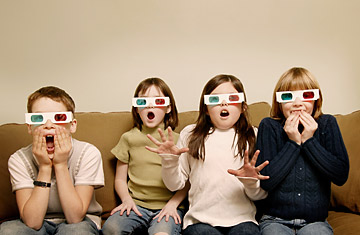
Mark the calendar: 2010 might be the year that TV's final frontier gets broken. Announced in early September, the newest models in the offing for late 2010 from Sony and Panasonic are bringing 3-D HDTV into the home. That is, if you're willing to wear the glasses.
Yes, glasses. They're not quite the flimsy red-and-blue-cellophane getups that they used to be, but the Sony and Panasonic models still require you to wear a pair of shades to observe the effect. And therein lies the rub. How can TV manufacturers convince you that seeing shows in 3-D is worth the annoyance of having to don a pair of specs?
The first way is by making the technology way better. After all, 3-D entertainment is nothing new. The early 1950s were flooded with 3-D movies, and the technology has made an occasional comeback ever since. (The highest-grossing 3-D film, oddly, was 1970's The Stewardesses, which made $27 million.) Each time, though, it's done in by the same complaints: poor image quality and headaches and eyestrain from extended viewing. Early reviews of the new models from Sony and Panasonic suggest they've solved the problem. Both use glasses that contain tiny shutters, opening and closing at 120 frames per second, in sync with the image on the screen to give the illusion of depth. It's a new approach that gives users a wider viewing angle, another weakness of older approaches.
All this would be pointless if the entertainment industry weren't also taking a new look at 3-D. The recent spate of 3-D movies on the big screen — G-Force, Monsters vs Aliens and My Bloody Valentine all had 3-D debuts this year — foreshadows a similar spurt on the small screen. Blu-ray discs, which have the storage capacity necessary for high-definition 3-D content, and their players are becoming more affordable, and Panasonic is working with movie studios to release 3-D editions of movies, timed to coincide with the first group of TVs. Broadcast networks are paying close attention too — ESPN broadcast the Sept. 12 USC vs. Ohio State college-football game in 3-D as a pilot test, and in Britain there are already stations dedicated to 3-D content.
But still. The glasses. The headgear necessary to watch modern 3-D TVs remains bulky — and, well, ugly — but Luxottica, maker of Ray-Ban, is working on a solution for that. The company plans to release 3-D glasses modeled after Ray-Ban's classic Wayfarer shades, giving even the style-concious enthusiast little reason to resist 3-D.
Little reason, that is, other than the cost. Sony says it envisions a 3-D TV in every U.S. home by the end of 2010. That's a pipe dream, especially with early models expected to cost as much as several thousand dollars, though no price has been released yet. But with more and more content producers coming on board and with positive early reviews, who knows? This may just be the time 3-D finally finds some staying power.
